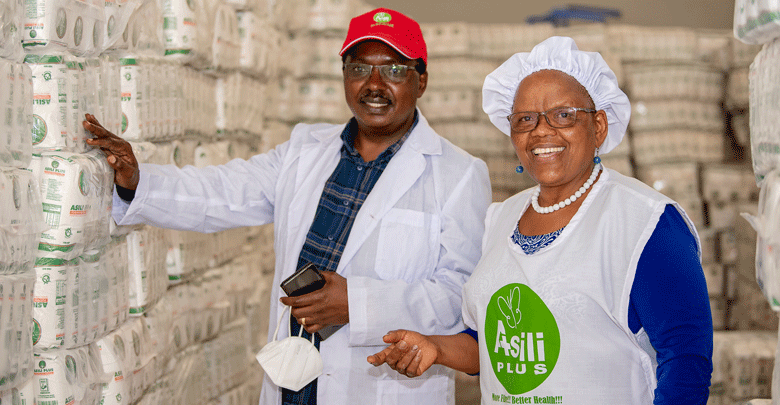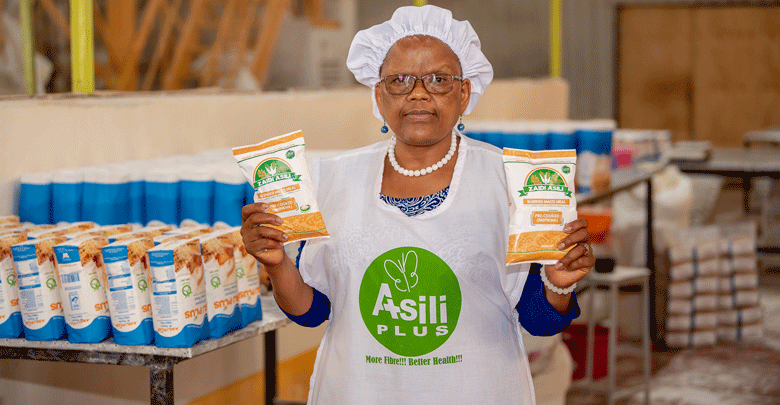Pre-cooked ugali, anyone?

For Ruth Kinoti, easing the process of cooking Kenya’s staple meal and adding more nutrients to the flour, was a venture she got into by chance and is paying off. She tells Milliam Murigi about how it worked out
@millymur1
Ugali is a Kenyan staple. But a number of Kenyans have been avoiding this dish because of its preparation process.
It takes one not less than 30 minutes to prepare ugali depending on the type of flour used, with a whole grain flour taking about an hour for one to get that perfect ugali.
Noting this gap, a Meru-based social enterprise, Shalem Investment Limited has introduced pre-cooked maize flour to the Kenyan market.
Pre-cooked flours, as the name suggests, are obtained from pre-cooked grains or by hydro-thermal extrusion of grains, maize, or any other source.
Such flours have been observed to provide a better textural and sensory experience than normal counterparts in multiple cases, owing to the processing that the pre-cooked flour undergoes.
“Unlike the normal sifted maize flour currently in the market, our pre-cooked flour uses whole grains and is blended with other products such as millet, soya beans, and sorghum to make it more nutritious,” says Ruth Kinoti, the managing director.

Ruth, a former teacher and her husband, Daniel, who used to work with different local and international non-governmental organisations, found themselves in this sector after a series of events.
“I grew up in a family of farmers. However, I graduated as a teacher and when I started working at a boarding school I noticed beans and maize formed a significant part of the school meals.
I approached the administration and proposed that my family and neighbours could supply the school with produce. Before I knew it, I was providing 10 schools with produce from smallholders in our network,” she says.
That is how Shalem Investments started. Now they market products for over 40,000 smallholder farmers, mostly maize, beans, sorghum and soybeans.
“We identify the markets and sell their produce with a good profit. The idea is to commercialise the farmers. We cluster them and their produce to enter markets, which would have been difficult to reach for individual smallholders.
Popular choice
Their venture into making flour was by chance. As a seed aggregator, they were contracted by East African Breweries Limited to be supplying them sorghum.
However, one day the brewer couldn’t buy the produce over taxation, and they were left with the stock. This forced them to rethink their target market and business model.
Although under their Asili brand, the business has also been producing sifted maize flour, wheat flour and porridge flour for the last two years, they ventured into pre-cooked flour after realising the entire world is moving towards ‘whole food’ because of the scare of lifestyle diseases that have caused concern.
“Pre-cooked flours are nowadays very popular among consumers because of their convenience of use, their improved nutritional and organoleptic qualities and their extended shelf life,” she adds.
Pre-cooked flour is known for its high fibre, vitamin B-1, and vitamin B-3 content, as well as being free from fats, saturated fats, and cholesterol.
It is also considered to be a good source of several minerals such as magnesium, iron, potassium, calcium, phosphorus, vitamin E, and antioxidants, thus offering a lot of health benefits, which has led to its increased demand.
“The reception for this product has been good. Those who have used our flour keep referring others to us.
Demand is growing daily and we expect this to continue. We roast our grains to their readiness to ensure that the end product takes less time to prepare.
With our flour, you will take less than 20 minutes to prepare your perfect ugali,” she reveals.
The idea of coming up with pre-cooked flour according to her was born a few months after they started making maize flour in 2018.
The reason being sifted maize flour has less nutritional value and they wanted to introduce to the market a more nutritious product.
However, lack of capital to buy the required equipment made them hold on to that dream until 2019 when the Global Alliance for Improved Nutrition (Gain) spotted them and decided to walk with them to make this dream a reality.
Gain is a global Swiss-based foundation that mobilises public-private partnerships and provides financial and technical support to deliver nutritious foods to those people most at risk of malnutrition.
Through Gain, they managed to do market research, come up with a business plan, purchase an extruder and a packaging machine.
This has helped them to introduce their innovative product — a whole food maize flour which cooks conveniently into the market.
“The best thing is that pre-cooked flours are more nutritious and do not interfere with the flavour of the products.
It is now upon Kenyans to make a nutritional switch from the much-liked white ugali to a nutritionally superior blended one with sorghum or millet,” she says.
Innovative approaches
Findings by Persistence Market Research, shows global pre-cooked flour market is expected to witness a significant value Compound Annual Growth Rate of around five per cent through 2030.
Owing to increased consumption of functional food, dietary supplements, and nutritionally-rich products by consumers across the world to maintain fitness and a healthy lifestyle.
Key players operating in the global pre-cooked flour market are more focused on increasing the quality of their products by using innovative technologies and creating a unique brand image.
They are also engaged in increasing production capacity by opening new state-of-the-art manufacturing facilities to cater to rising demand for pre-cooked flour across geographies.
Manufacturers are also taking innovative approaches such as sourcing premium quality grains from different origins to offer a higher quality of pre-cooked flour for different end-use industry verticals.
Though currently, this product is available in Meru and its environs, she says that the flour will be readily available countrywide by next several months.












